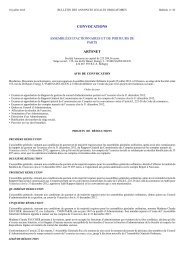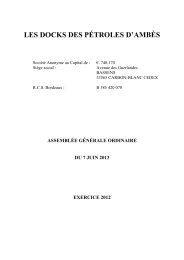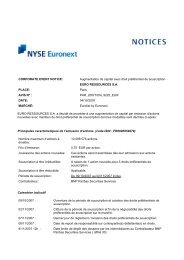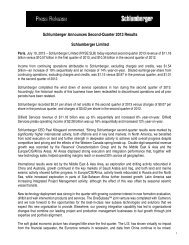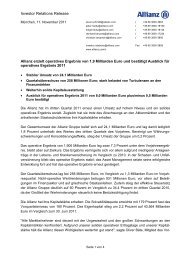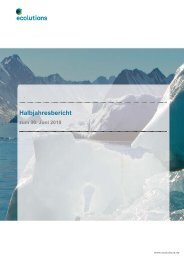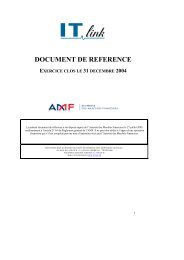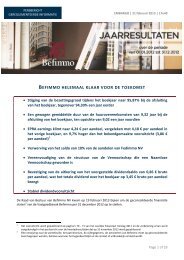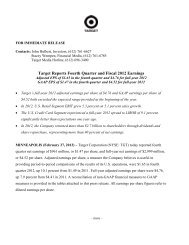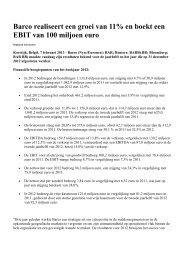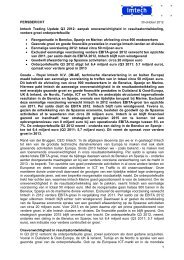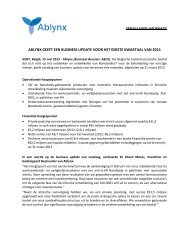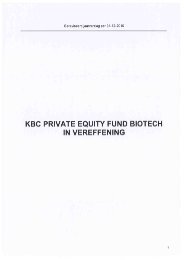FORM 10-Q
FORM 10-Q
FORM 10-Q
Create successful ePaper yourself
Turn your PDF publications into a flip-book with our unique Google optimized e-Paper software.
• Income (loss) before income taxes was reduced by $ 9 million for Bottling Investments and $140 million for Corporate due to the devaluation of the<br />
Venezuelan bolivar, including our proportionate share of the charge incurred by an equity method investee which has operations in Venezuela. Refer to<br />
Note <strong>10</strong>.<br />
• Income (loss) before income taxes was reduced by $ 30 million for Bottling Investments due to the Company’s proportionate share of unusual or<br />
infrequent items recorded by certain of our equity method investees. Refer to Note <strong>10</strong>.<br />
During the three months ended March 30, 2012, the results of our operating segments were impacted by the following items:<br />
• Operating income (loss) and income (loss) before income taxes were reduced by $ 61 million for North America, $15 million for Bottling Investments<br />
and $3 million for Corporate due to the Company's productivity and reinvestment program as well as other restructuring initiatives. Refer to Note <strong>10</strong> and<br />
Note 11. Operating income (loss) and income (loss) before income taxes were increased by $ 1 million for Europe due to the reversal of an accrual related<br />
to the Company's 2008–2011 productivity initiatives.<br />
• Operating income (loss) and income (loss) before income taxes were reduced by $ 20 million for North America due to changes in the Company's readyto-drink<br />
tea strategy as a result of our current U.S. license agreement with Nestlé terminating at the end of 2012. Refer to Note <strong>10</strong>.<br />
• Operating income (loss) and income (loss) before income taxes were reduced by $ 6 million for North America due to costs associated with the Company<br />
detecting residues of carbendazim, a fungicide that is not registered in the United States for use on citrus products, in orange juice imported from Brazil<br />
for distribution in the United States. As a result, the Company began purchasing additional supplies of Florida orange juice at a higher cost than<br />
Brazilian orange juice. Refer to Note <strong>10</strong>.<br />
• Income (loss) before income taxes was reduced by $ 3 million for Corporate due to changes in the structure of BPW, our 50/50 joint venture with Nestlé<br />
in the ready-to-drink tea category. Refer to Note <strong>10</strong>.<br />
• Income (loss) before income taxes was increased by $ 44 million for Bottling Investments due to the Company's proportionate share of unusual or<br />
infrequent items recorded by certain of our equity method investees. Refer to Note <strong>10</strong>.<br />
Item 2. Management's Discussion and Analysis of Financial Condition and Results of Operations<br />
When used in this report, the terms "The Coca-Cola Company," "Company," "we," "us" or "our" mean The Coca-Cola Company and all entities included in<br />
our condensed consolidated financial statements.<br />
Recoverability of Current and Noncurrent Assets<br />
CRITICAL ACCOUNTING POLICIES AND ESTIMATES<br />
Our Company faces many uncertainties and risks related to various economic, political and regulatory environments in the countries in which we operate,<br />
particularly in developing and emerging markets. Refer to the heading "Item 1A. Risk Factors" in Part I and "Our Business — Challenges and Risks" in<br />
Part II of our Annual Report on Form <strong>10</strong>-K for the year ended December 31, 2012. As a result, management must make numerous assumptions that involve a<br />
significant amount of judgment when performing recoverability and impairment tests of noncurrent assets in various regions around the world.<br />
We perform recoverability and impairment tests of noncurrent assets in accordance with accounting principles generally accepted in the United States. For<br />
certain assets, recoverability and/or impairment tests are required only when conditions exist that indicate the carrying value may not be recoverable. For other<br />
assets, impairment tests are required at least annually, or more frequently if events or circumstances indicate that an asset may be impaired.<br />
Our equity method investees also perform such recoverability and/or impairment tests. If an impairment charge is recorded by one of our equity method<br />
investees, the Company records its proportionate share of the charge as a reduction of equity income (loss) — net in our condensed consolidated statement of<br />
income. However, the actual amount we record with respect to our proportionate share of such charges may be impacted by items such as basis differences,<br />
deferred taxes and deferred gains.<br />
Investments in Equity and Debt Securities<br />
Investments classified as trading securities are not assessed for impairment since they are carried at fair value with the change in fair value included in net<br />
income. We review our investments in equity and debt securities that are accounted for using the equity method or cost method or that are classified as<br />
available-for-sale or held-to-maturity each reporting period to determine whether a significant event or change in circumstances has occurred that may have an<br />
adverse effect on the fair value of each investment. When such events or changes occur, we evaluate the fair value compared to our cost basis in the<br />
investment. We also perform this evaluation every reporting period for each investment for which our cost basis has exceeded the fair value in the prior period.<br />
The fair values of most of our Company's investments in publicly traded companies are often readily available<br />
25



